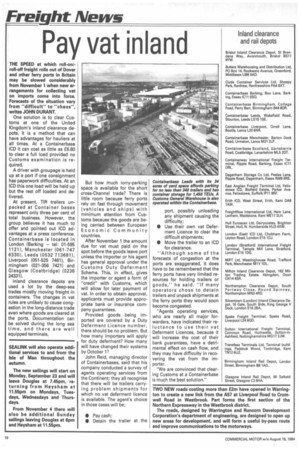Pay vat inland
Page 12

If you've noticed an error in this article please click here to report it so we can fix it.
THE SPEED at which roll-on/roll-off freight rolls out of Dover and other ferry ports in Britain may be slowed considerably from November 1 when new arrangements for collecting vat on imports come into force. Forecasts of the situation vary from "difficult" to "chaos", writes JOHN DURANT.
One solution is to clear Customs at one of the United Kingdom's inland clearance depots. It is a method that can have advantages for hauliers at all times. At a Containerbase ICD it can cost as little as £6.80 to clear a full load provided no Customs examination is required.
A driver with groupage is held up at a port if one consignment has paperwork difficulties. At an ICD this one load will be held up but the rest off loaded and delivered.
At present, TIR trailers unpacked at Container bases represent only three per cent of total business. However, the group believes it has much to offer and pointed out 1CD advantages at a press conference. Containerbase is located in London (Barking tel: 01-595 1121), Manchester (061-747 6330), Leeds (0532 713681), Liverpool (051-525 7461), Birmingham (021-356 7421) and Glasgow (Coatbridge) (0236 24331).
Inland clearance depots are used a lot by the deep-sea trades mostly moving freight in containers. The changes in vat rules are unlikely to cause congestion in the long-distance trade even where goods are cleared at the ports. Documentation can be solved during the long sea time, and there are well equipped terminals. But how much lorry-parking space is available for the short cross-Channel trade? There is little room because ferry ports rely on fast through movement (vehicles and ships) with minimum attention from Customs because the goods are being carried between European Economic Community countries.
After November 1 the amount due for vat must paid on the spot before the goods leave port unless the importer or his agent has general approval under the Customs Duty Deferment Scheme. This, in effect, gives the importer or agent a form of "credit" with Customs, which will allow for later payment of vat. In order to obtain approval, applicants must provide appropriate bank or insurance company guarantees.
Provided goods being imported are covered by a Duty Deferment Licence number, there should be no problem. But how many importers will apply for duty deferment? How many will have changed their systems by October 1?
John Reid, managing director of Containerbases, said that his company conducted a survey of agents operating services from the Continent; they all recognise that there will be trailers carrying problem shipments for which no vat deferment licence is available. The agent's choice in those cases will be; • Pay cash; • Detain the trailer at the port, possibly unloading any shipment causing the difficulty; • Use their own vat Deferment Licence to clear the difficult shipments; • Move the trailer to an ICD for clearance.
"Although some of the forecasts of congestion at the ports are exaggerated, it does have to be remembered that the ferry ports have very limited resources for holding trailers or goods," he said. "If many operators chose to detain trailers and unpack shipments at the ferry ports they would soon become congested.
"Agents operating services, who are nearly all major forwarders, have indicated their reuct a nce to use their vat Deferment Licences, because it will increase the cost of their bank guarantees, have a detrimental effect on cash flow, and they may have difficulty in recovering the vat from the importer.
"We are convinced that clearing Customs at a Containerbase is much the best solution."








































































